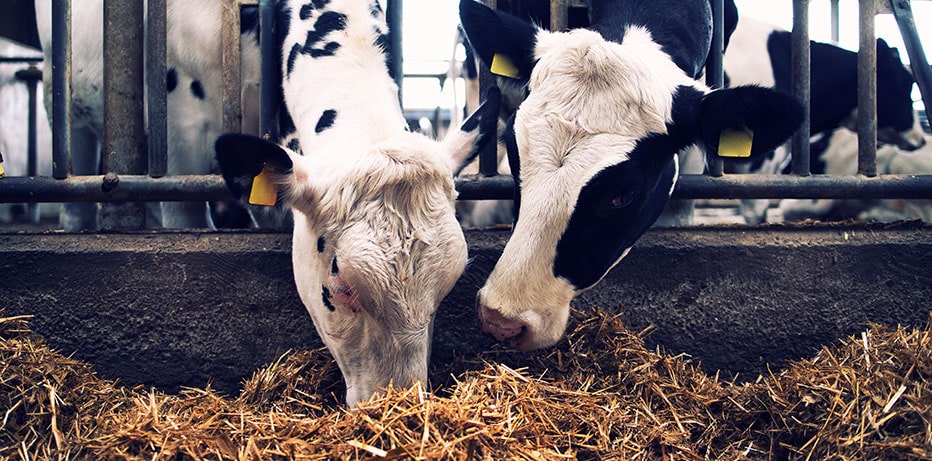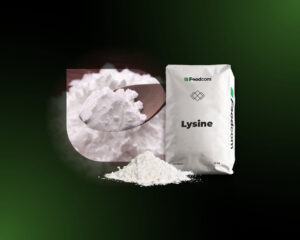- Lysine is an organic chemical compound which belongs to the group of protein amino acids.
- It is used in the production of medicines and cosmetics.
- Lysine also has a major impact on animal health, so it is an essential ingredient for animal feed.
What is Lysine?
Lysine is an organic chemical compound. It belongs to the amino acids, more precisely to the essential amino acids, i.e. those that the human body does not produce itself, but which are necessary for its proper functioning. Free Lysine is called L-lysine.
Lysine is mainly found in zoonotic foods. For this reason, vegetarians and vegans, as well as people on restrictive diets, are most at risk for lysine deficiency. Sources of this amino acid include products such as eggs, cheese, poultry and red meat, fish, but also legumes and nuts. Lysine can also be obtained on an industrial scale – from caprolactam. It is usually in the form of a white powder. Want to learn more about the amino acid lysine? Read on to learn more about its uses!
Lysine – functions
Lysine has very many functions in the human body. It has a great influence on the skeletal system and joints, as it is one of the amino acids involved in the synthesis of collagen proteins, in addition to supporting the absorption of calcium. Since it contributes to the formation of Collagen, it also makes the skin elastic and firm.
In addition, Lysine is involved in the production of L-carnitine, a compound responsible for accelerated fat metabolism, muscle regulation and energy production. Therefore, it is good for people who lose weight, but also for athletes who train intensively to build muscle mass.
Lysine also has a protective effect on the cardiovascular system, as it maintains the normal structure of arterial walls. It is also involved in the production of antibodies, which means that it strengthens the work of the immune system. In addition, it inhibits the production of arginine, which limits the development of the herpes simplex virus.
In addition, Lysine has an effect on mental concentration – it helps with stress and anxiety. When Lysine is combined with other antioxidants, such as vitamin C, it prevents the formation and spread of cancer cells.
Lysine – applications
Since Lysine has many functions in the human body, it is used in medicines. This amino acid is not produced by humans themselves. Therefore, if it is not consumed in sufficient quantities in the diet, it must be supplemented. The pharmaceutical industry takes advantage of this and produces many types of dietary supplements with Lysine.
Lysine is also used in the cosmetics industry. It is involved in the formation of Collagen, and affects the good condition of the skin. Therefore, it is included in many cosmetics, such as anti-aging products or lotions to prevent herpes. Lysine is also used in cosmetics to fight acne and accelerates healing.
However, the most common use of Lysine is to add it to livestock feed. Animals, like humans, cannot produce Lysine on their own, and even normal feed does not contain enough of this amino acid. Therefore, it must be added as a dietary ingredient or feed additive if farmers want to achieve better production results.

Feed Lysine – animal nutrition
Lysine is added to feed rations for poultry, dairy cows, pigs and fish, especially when levels from other protein sources such as soybean meal and corn are insufficient. As an amino acid involved in protein synthesis, it helps optimize animal growth or increase milk production. It also strengthens the animals’ immunity. In addition, Lysine in feed reduces the severity, duration of treatment and recurrence of herpes in animals. Industrially produced Lysine is fully digestible by animals, but should not be used for too long as it can cause gallstones or kidney problems.
The use of Lysine in feed is not only beneficial for animal health, but also for the farmer’s wallet and the environment. This is because the use of this amino acid eliminates the need for more expensive raw materials such as soybean meal. This reduces nitrogen emissions into the environment.
Why Foodcom?
Our great team of Sales Support will help our Traders conduct the contract and business deals in a smooth and efficient way to ensure the best quality service to all our Business Partners. Our logistics team will take care of transportation and the financial department will be responsible for all matters connected with the financial part of the deal. Do not hesitate! Contact us.









